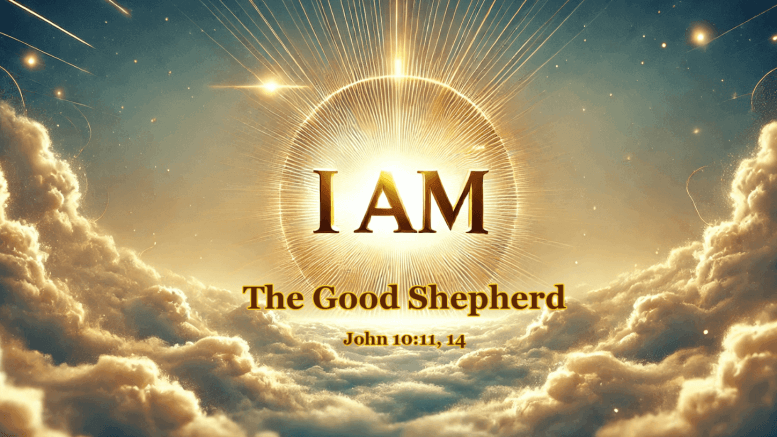Discover the profound insights and transformative truths about Jesus, the great “I AM,” in our series designed to inspire and uplift your spiritual journey. Dive into the complete collection here: I AM Series.
In an era where leadership often feels distant and impersonal, Jesus Christ’s declaration in John 10:11 and 14, “I am the good shepherd,” offers a refreshing and comforting image of care, guidance, and protection. This metaphor is deeply rooted in the cultural and historical context of shepherding, presenting Jesus as the ultimate guardian and nurturer of our souls.
The Good Shepherd: A Metaphor of Care and Protection
Shepherding in ancient times was a demanding and intimate occupation. Shepherds lived with their sheep, leading them to pastures, protecting them from predators, and tending to their wounds. When Jesus describes Himself as the Good Shepherd, He is emphasizing His commitment to His followers’ well-being. He contrasts Himself with hired hands who flee at the first sign of danger, underscoring His willingness to lay down His life for His sheep.
Contextualizing the Declaration
Jesus’ declaration comes within a discourse where He contrasts His role as the Good Shepherd with false shepherds, or religious leaders, who have failed their people. In John 10:11, He states, “I am the good shepherd. The good shepherd lays down his life for the sheep.” This statement not only highlights His sacrificial love but also His intimate knowledge of His followers. In verse 14, He reiterates, “I am the good shepherd; I know my sheep and my sheep know me.” This mutual recognition reflects a deep, personal relationship between Jesus and His followers.
Essential for Spiritual Life
The imagery of Jesus as the Good Shepherd is essential for understanding His role in our spiritual lives. Just as a shepherd ensures the safety and sustenance of his flock, Jesus provides spiritual nourishment and protection. He leads us to “green pastures” and “still waters,” restoring our souls and guiding us along the paths of righteousness (Psalm 23). His presence assures us that even in the darkest valleys, we need not fear, for He is with us.
Invitation to Follow
Jesus’ declaration is also an invitation to trust and follow Him. He calls His sheep by name, and they recognize His voice (John 10:3-4). This imagery invites us to cultivate a close relationship with Him, listening for His guidance and following His lead. It’s a call to leave behind the distractions and dangers of the world and enter into the safety and peace of His fold.
Sacrificial Love and Protection
A defining characteristic of the Good Shepherd is His willingness to sacrifice Himself for His sheep. Unlike a hired hand who abandons the sheep at the sight of a wolf, Jesus lays down His life to protect His flock. This sacrificial love was ultimately demonstrated on the cross, where He bore the sins of humanity to reconcile us with God. His resurrection ensures that He continues to watch over and protect His flock eternally.
The Divine Shepherd
Jesus’ claim to be the Good Shepherd also affirms His divine nature. In the Old Testament, God is often depicted as the Shepherd of Israel (Psalm 23; Ezekiel 34). By identifying Himself as the Good Shepherd, Jesus is aligning Himself with this divine role, asserting His identity as God incarnate. His knowledge of His sheep and His intimate relationship with them further highlight His divine omniscience and love.
Conclusion
Jesus’ declaration, “I am the good shepherd,” is a profound invitation to experience His care, guidance, and protection.
In a world where leaders often fail and dangers abound, He offers the assurance of His constant presence and sacrificial love. Just as a shepherd knows his sheep and lays down his life for them. Jesus knows us intimately and has given His life to secure our eternal well-being. Let us trust in Him, follow His lead, and find comfort in the knowledge that we are always under the watchful care of the Good Shepherd.





